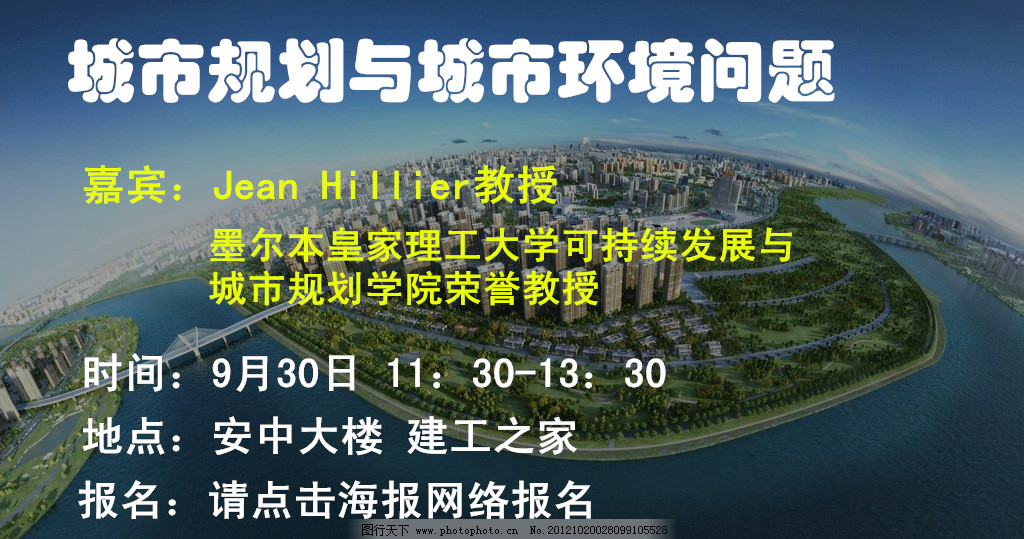主讲人:Jean Hillier教授,墨尔本皇家理工大学可持续发展与城市规划学院,荣誉教授
客座嘉宾:韩昊英教授,城乡规划理论与技术研究所,所长
Jean Hillier教授简介:
简•希利尔教授于2003年至2011年在英国纽卡斯尔大学任教,教授规划理论与职业伦理学。2011年起至澳大利亚皇家墨尔本理工大学执教并任全球研究、社会科学与规划学院副院长,2014年退休。希利尔教授的研究涉及在不确定性条件下发展适用于战略规划实践的后结构主义规划理论,重点研究适应性与弹性规划;并借鉴德勒兹、瓜塔里、福柯与拉康等人的思想来分析规划决策与过程。近期出版的著作包括与Patsy Healey合编的《战略规划的概念性挑战》(2010)与三卷本《规划理论中的批判性文集》(2008),以及《超越地平线:关于管治、空间与时间》(2007),著作并被译为丹麦文、西班牙文与中文。希利尔教授同时兼任芬兰赫尔辛基工业大学城市和区域研究所主任、丹麦罗斯基勒大学环境、社会和空间交换系客座教授以及欧盟专家咨询委员会成员,同时还是国际期刊Planning Theory、Journal of Planning Education and Research,Geography Research Forum,International Planning Studies与Urban Policy and Research等多份国际期刊的编委。
韩昊英教授简介:
韩昊英,男,浙江大学建筑工程学院区域与城市规划系教授,博士生导师,浙江大学城乡规划理论与技术研究所所长,Elsevier国际期刊Journal of Urban Management副主编。曾就读于清华大学建筑学院建筑系,获建筑学学士学位;清华大学建筑学院城市规划系,获工学硕士学位;日本东京大学都市工学系,获博士学位。2007年10月进入浙江大学公共管理学院土地管理系工作,2014年9月开始在浙江大学建筑工程学院区域与城市规划系工作。曾连续多年被评为“浙江大学优秀德育导师”,并荣获“浙江省首届五星级青年教师”、“浙江省之江青年社科学者”、“浙江大学第六届教书育人先进个人”和“浙江大学求是青年学者”等称号,以及华夏建设科学技术奖一等奖、金经昌中国城市规划学会优秀论文奖和中国风景园林学会优秀风景园林规划设计一等奖等奖项。
韩昊英的主要研究领域为城市规划决策和复杂理论,以及城市增长边界相关的实证研究。主要研究成果发表在Environment and Planning B: Planning and Design、Land Use Policy、Landscape and Urban Planning和Cities等国际著名学术期刊以及《城市规划学刊》、《地理学报》和《中国土地科学》等国内知名学术期刊上。曾出版题目为《Urban Complexity and Planning: Theories and Computer Simulations》(Michael Batty院士和Lewis Hopkins教授等国际权威专家作序,Ashgate国际出版社出版)、《城市增长边界的理论与应用》、《行为规划理论:城市规划的新逻辑》和《复杂:城市规划的新观点》等专著和题目为《融入未来:预测、情境、规划和个案》等译著。
报告简介:城市规划是技术与行政干预相结合的过程,其中涉及到对土地、城市环境、空气和水的设计和使用。希利尔教授探讨了与空气相关的规划范畴,认为如果将空气认为具有公共属性,那么其产权、安全性和可达性就很值得讨论。她将特别讨论噪声和人造光源带来的污染,以及规划实践和法律对城市未来的影响。
Abstract:Urban planning is defined as a technical and political process concerned with the uses of land and design of the urban environment, including air and water. It could be argued that air comprises a form of 'unlanded' commons. In this paper I explore the under-researched and under-discussed issue of air tenure. If air is regarded as a form of commons, then what it contains becomes important for discussion of questions of tenure, access, security and so on. Such issues may be problematised from the gas and chemical warfares of World War I onwards to today's and future drone activities by public and private agencies. While planning practice has been concerned with differentiating between 'good' and 'bad' air and with regulations aimed at controlling 'pollution' of our visual, aural and olfactory senses, local authority regulation of individual sources of light, noise and smell will remain ultimately lacking in effectiveness due to the noncontainability of waves and particulates and the commons nature of they air which they inhabit. I offer a set of thoughts inspired by Gilles Deleuze with specific reference to issues of drones and artificial light. I conclude that we need to urgently rethink our planning practices and legal frameworks if they are to have relevance for the future.
Keywords: Air;Planning law;Pollution;Property;Haecceity


